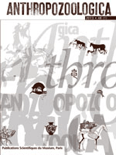
ANTHROPOZOOLOGICA
metrics 2024
Charting New Territories in Anthropology and Animal Science
Introduction
ANTHROPOZOOLOGICA, published by Publications Scientifiques du Museum, Paris, is a leading journal at the intersection of anthropology and animal science. With its ISSN 0761-3032 and E-ISSN 2107-0881, this esteemed publication has established its relevance in both fields, holding a Q3 ranking in Animal Science and Zoology and a Q2 ranking in Anthropology as of 2023. The journal aims to foster interdisciplinary research by providing a platform for scholars to explore the complex relationships between humans and animals, considering ecological, cultural, and evolutionary perspectives. Over its converged years from 2011 to 2024, ANTHROPOZOOLOGICA has gained significant recognition, reflected in its Scopus rankings where it stands at #197/502 in Anthropology and #345/490 in Animal Science. While not currently open access, the journal’s rigorous editorial standards and commitment to advancing knowledge make it an invaluable resource for researchers, professionals, and students aiming to deepen their understanding of anthropozoological phenomena.
Metrics 2024
 0.23
0.23 0.70
0.70 0.40
0.40 12
12Metrics History
Rank 2024
Scopus
IF (Web Of Science)
JCI (Web Of Science)
Quartile History
Similar Journals

BERLINER UND MUNCHENER TIERARZTLICHE WOCHENSCHRIFT
Exploring Innovations in Veterinary MedicineBERLINER UND MUNCHENER TIERARZTLICHE WOCHENSCHRIFT is an esteemed journal in the fields of Veterinary Science and Medicine, published by SCHLUETERSCHE VERLAGSGESELLSCHAFT MBH & CO KG. Since its inception in 1946, this journal has served as a vital platform for advancing knowledge and research in veterinary medicine within Germany and beyond. With a current impact factor that places it in the Q4 category in both Medicine and Veterinary, it continues to provide significant insights for professionals, researchers, and students engaged in the veterinary community. Although it is not an Open Access journal, its rich content contributes to the foundational literature of the field, making it an essential reference. Researchers looking to publish their findings or keep informed on the latest advancements in veterinary and medical practices will find this journal an invaluable resource. It is headquartered in Hannover, Germany, and serves as a testament to the ongoing dedication to veterinary research since the mid-20th century.
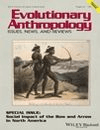
EVOLUTIONARY ANTHROPOLOGY
Illuminating the Path of Human Development Through ResearchEVOLUTIONARY ANTHROPOLOGY is a premier journal published by WILEY, dedicated to advancing the field of anthropology through innovative and rigorous research. With an ISSN of 1060-1538 and an E-ISSN of 1520-6505, this journal boasts a remarkable Q1 ranking in both the Anthropology and Medicine (miscellaneous) categories, reflecting its significant impact within the academic community. Since its inception in 1992, it has continuously evolved, now encompassing a wide array of subjects pertinent to evolutionary studies and human health. Residing in the highly competitive Scopus rankings, it stands at an impressive rank of 10 out of 502 in the field, placing it within the top 2% of journals in Social Sciences - Anthropology. Researchers, professionals, and students alike will find this journal an invaluable resource for the latest findings, theoretical advancements, and discussions that shape our understanding of human evolution and its biological implications. While not categorized as an Open Access journal, EVOLUTIONARY ANTHROPOLOGY remains a vital outlet for high-quality scholarship, fostering dialogue and enriching knowledge across diverse audiences.

Thai Journal of Veterinary Medicine
Elevating animal health through research and innovation.Thai Journal of Veterinary Medicine, published by Chulalongkorn University, serves as a vital resource for researchers, practitioners, and students in the field of veterinary science. With an ISSN of 0125-6491, the journal has been providing a platform for the dissemination of original research and reviews since its inception, with a focus on advancing veterinary practice and animal health in Thailand and the broader Southeast Asian region. The journal is recognized in the Scopus database, currently ranked in the Q4 category for Veterinary (miscellaneous), reflecting its commitment to quality despite being in a highly competitive space. The scope of the journal encompasses a wide array of topics pertinent to veterinary medicine, ensuring accessibility to diverse veterinary disciplines. While the journal currently does not offer an open-access option, it remains dedicated to contributing valuable knowledge and insights to the veterinary community, supporting the improvement of animal welfare and public health initiatives in the region. As it continues to publish until 2024, the Thai Journal of Veterinary Medicine invites contributions that align with its objectives of fostering scholarly discourse and advancing veterinary research.
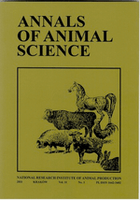
Annals of Animal Science
Unlocking Insights in Animal Science ResearchAnnals of Animal Science is a prestigious academic journal, published by Walter de Gruyter GmbH in Germany, specializing in the multifaceted field of Animal Science. With an ISSN of 1642-3402 and an E-ISSN of 2300-8733, this journal is recognized for its high-impact contributions, holding a commendable impact factor that demonstrates its relevance in nurturing quality research. The journal has garnered Q2 rankings in 2023 across various categories including Animal Science and Zoology, Food Animals, and Small Animals. Notably, its Scopus Rankings indicate an elite standing, with the journal placing in the top 10% within its specific fields. Covering converged years from 2008 to 2024, the Annals of Animal Science serves as an essential platform for researchers, professionals, and students to disseminate knowledge and advance studies related to animal health, welfare, and production. The journal also emphasizes open access, promoting broader accessibility to foster collaboration and innovation in Animal Science globally. For those committed to advancing their understanding of veterinary and agricultural sciences, this journal is a vital resource.
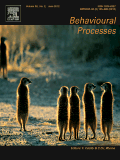
Behavioural Processes
Charting the course of behavioral research since 1976.Behavioural Processes, published by Elsevier, is a prominent academic journal that explores the intricate dynamics of behavior across various species, providing a multidisciplinary platform for researchers in the fields of Animal Science and Zoology, Behavioral Neuroscience, and Medicine. With a rich history dating back to 1976 and expected to continue until 2024, the journal has garnered recognition, achieving a Q2 ranking in Animal Science and Zoology and securing a significant position within Scopus rankings. Behavioural Processes serves as a vital resource for advancing our understanding of behavioral mechanisms, fostering innovation in both theoretical frameworks and practical applications. Although it is not an open access journal, its rigorous peer-review process ensures high-quality publishing, making it an essential tool for professionals, researchers, and students dedicated to uncovering the complexities of behavior. For further information, please visit the journal's webpage hosted by Elsevier in Amsterdam, Netherlands.
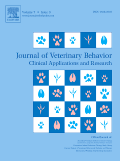
Journal of Veterinary Behavior-Clinical Applications and Research
Exploring the science behind veterinary behavior.The Journal of Veterinary Behavior-Clinical Applications and Research, published by Elsevier Science Inc, is a premier outlet for original research and clinical studies in the field of veterinary behavior. With an ISSN of 1558-7878 and an E-ISSN of 1878-7517, this journal serves as an essential resource for veterinarians, animal behaviorists, and researchers dedicated to understanding and improving animal welfare through behavioral science. The journal holds a respectable Q2 ranking in the Veterinary (miscellaneous) category as of 2023, attesting to its significant impact in the field. Although it does not offer open access options, it fosters a community of professionals who are passionate about advancing the application of behavioral research in clinical settings. With coverage extending from 2006 to 2024, the journal aims to disseminate valuable insights that contribute to effective behavior management and intervention strategies, ultimately enhancing the relationship between animals and their caregivers.

Revista de Investigaciones Veterinarias del Peru
Innovating Animal Health Research Across BordersRevista de Investigaciones Veterinarias del Peru, published by UNIV NACIONAL MAYOR SAN MARCOS, stands as a pivotal resource within the field of veterinary sciences. With its ISSN 1682-3419 and E-ISSN 1609-9117, this journal aims to publish innovative research contributing to the advancement of veterinary practices and animal health. Since its inception in 1999, it has fostered an academic platform for professionals and researchers alike to share findings that are crucial for understanding and improving animal welfare in Peru and beyond. Although currently positioned in the Q3 category of Veterinary (miscellaneous) and ranked #163 out of 194 in the Scopus database, the journal's commitment to quality research and open access to veterinary knowledge continues to attract submissions and readership from a diverse audience. As it moves forward into 2024, the Revista de Investigaciones Veterinarias del Peru remains dedicated to disseminating critical insights that promote evidence-based practices in the veterinary field, stimulating further research and collaboration across continents.

BMC Veterinary Research
Championing open access for veterinary excellence.BMC Veterinary Research, published by BMC in the United Kingdom, stands as a pivotal open-access platform dedicated to advancing the field of veterinary science since its inception in 2005. With an impressive impact factor that reflects its influential presence, this journal has achieved a remarkable ranking of #17 out of 194 in the Scopus Veterinary category, placing it in the 91st percentile among its peers. The journal serves as an essential resource for researchers, professionals, and students alike, fostering the dissemination of high-quality research and innovative practices within the veterinary and broader medical communities. With its commitment to open access, BMC Veterinary Research ensures that valuable insights are accessible to all, promoting collaboration and knowledge sharing that drive the advancement of veterinary sciences. As it continues to publish significant findings until 2024, it remains a key contributor to the contemporary discourse on animal health and welfare.

AGRICULTURAL HISTORY REVIEW
Charting the Historical Landscape of AgricultureAGRICULTURAL HISTORY REVIEW, published by the BRITISH AGRICULTURAL HISTORY SOC, serves as a vital resource for scholars and professionals exploring the intersections of agriculture, society, and history. With a publication history spanning from 1978 to 2023, the journal delves into diverse topics within the fields of agronomy, animal science, and the history of science, all while maintaining a commitment to rigor and scholarly excellence, as reflected in its prestigious rankings. Although it falls within Q4 in Agronomy, Animal Science, and Economics, it holds a commendable Q3 status in History and Philosophy of Science, indicating a significant contribution to the understanding of agricultural practices through historical lenses. The journal is based in the United Kingdom and is accessible for those interested in gaining insights into the historical aspects of agricultural development. While the journal does not provide open access options, it remains a critical reference for researchers seeking to enhance their understanding of agriculture's past and its implications for future practices.

EXPERIMENTAL ANIMALS
Uniting disciplines to enhance animal welfare and scientific inquiry.EXPERIMENTAL ANIMALS is a leading journal that serves the vibrant fields of Animal Science, Veterinary Medicine, and Biochemistry, Genetics, and Molecular Biology, published by the prestigious INT PRESS EDITING CENTRE INC in Japan. Boasting an impressive track record since its inception in 1974, the journal has positioned itself as a crucial platform for researchers aiming to disseminate innovative findings in experimental animal research. With a commendable impact factor and categorized in the Q2 and Q3 quartiles by Scopus in various relevant fields for 2023, EXPERIMENTAL ANIMALS exemplifies excellence in its contributions to science. The journal offers a comprehensive range of articles spanning from animal welfare and experimental methodologies to genetic studies, ensuring a multidisciplinary approach that appeals to a diverse audience of researchers, professionals, and students. Access to its wealth of knowledge fosters significant advancements in research and practice, underlining the journal's commitment to enhancing understanding of animal models in scientific inquiry.